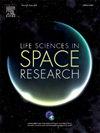An emerging paradigm for scientific decision: the AI evaluation of space science projects
IF 2.8
3区 生物学
Q2 ASTRONOMY & ASTROPHYSICS
引用次数: 0
Abstract
In the past six decades, the progress of spaceflight projects has won the admiration of the whole world. However, how to evaluate the values of research projects remains an esoteric and cost effective question. To improve the selections in space science projects, we utilized AI tools to provide an overall framework for broader audience. Our work conducted a three-phased study. We explored space life science research as it is one of the most intensively researched areas in space science. We learned the domain science data and constructed a space science knowledge graph. Subsequently, to better extract semantic features, we introduced SpaceBERT, a pre-trained language model fine-tuned with contrastive learning. We then developed SpaceGL, a deep learning framework tailored for predicting frontier research. Lastly, we prioritized candidate space experimental projects based on AI model and compared with the real results from the science panel judges and the “Lottery model.”
科学决策的新兴范例:空间科学项目的人工智能评估
在过去的60年里,航天工程的进展赢得了全世界的钦佩。然而,如何评估研究项目的价值仍然是一个深奥和成本效益的问题。为了改进空间科学项目的选择,我们利用人工智能工具为更广泛的受众提供了一个整体框架。我们的研究分为三个阶段。空间生命科学是空间科学中研究最深入的领域之一,我们开展了空间生命科学研究。学习领域科学数据,构建空间科学知识图谱。随后,为了更好地提取语义特征,我们引入了SpaceBERT,这是一个经过对比学习微调的预训练语言模型。然后,我们开发了SpaceGL,这是一个专门用于预测前沿研究的深度学习框架。最后,我们根据人工智能模型对候选空间实验项目进行了排序,并与科学评委会评委的实际结果和“抽奖模型”进行了比较。
本文章由计算机程序翻译,如有差异,请以英文原文为准。
求助全文
约1分钟内获得全文
求助全文
来源期刊

Life Sciences in Space Research
Agricultural and Biological Sciences-Agricultural and Biological Sciences (miscellaneous)
CiteScore
5.30
自引率
8.00%
发文量
69
期刊介绍:
Life Sciences in Space Research publishes high quality original research and review articles in areas previously covered by the Life Sciences section of COSPAR''s other society journal Advances in Space Research.
Life Sciences in Space Research features an editorial team of top scientists in the space radiation field and guarantees a fast turnaround time from submission to editorial decision.
 求助内容:
求助内容: 应助结果提醒方式:
应助结果提醒方式:


